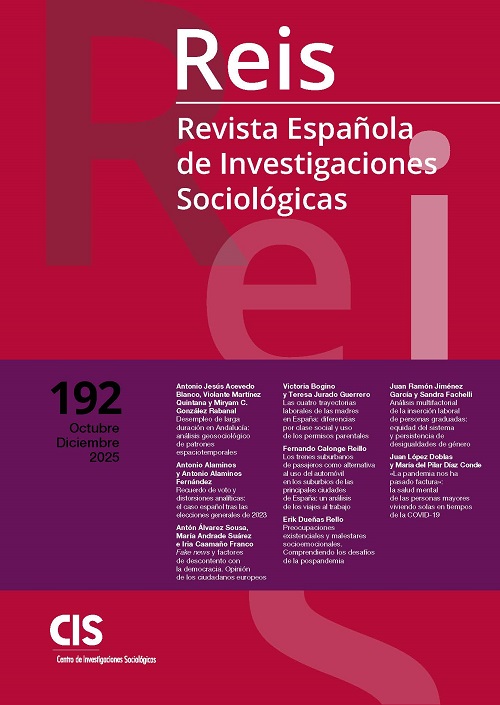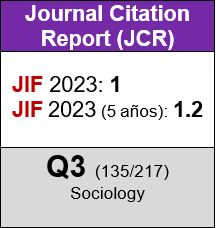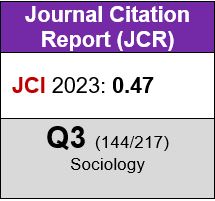Recuerdo de voto y distorsiones analíticas: el caso español tras las elecciones generales de 2023
DOI:
https://doi.org/10.5477/cis/reis.192.27-46Palabras clave:
Barómetros, Centro de Investigaciones Sociológicas, Intención de voto, Ocultación de voto, Ponderación, Recuerdo de voto, Transferencia de votoResumen
Esta investigación analiza mediante triangulación (unidad de análisis y método) el recuerdo de voto medido en los barómetros del Centro de Investigaciones Sociológicas y los resultados de las elecciones generales del 23 de julio de 2023 en España. Se constata una diferencia significativa del recuerdo de voto al Partido Popular y Vox, asociada con la ocultación de voto. Una ocultación de voto que podría actuar como estado intermedio del intercambio de transferencias entre PP y Vox. Los porcentajes de recuerdo de voto al PSOE y Sumar no difieren estadísticamente con sus resultados. Se concluye que el recuerdo de voto posee valor analítico propio; su uso como variable de ponderación paramétrica distorsiona los resultados de las encuestas, eliminando un indicador muy útil para el análisis de procesos latentes en dinámicas electorales.
Descargas
Citas
Adán, Gonzalo (2024). Comparecencia ante la Comisión de Investigación sobre la gestión del presidente del CIS. Diario de Sesiones del Senado, n.º 275, 19 de diciembre.
Alaminos, Antonio (1994). Predicciones electorales en España. En: VVAA. Future Days. Jornadas de prospectiva electoral. Alicante: Fundación Cultural CAM.
Alaminos, Antonio (1998). Teoría y práctica de la encuesta. Aplicación en los países en vías de desarrollo. Alicante: Editorial Club Universitario.
Alaminos, Antonio (2018). «La monitorización de la estimación de voto con modelos ponderados y no ponderados: un test empírico». Sociologiados. Revista de Investigación Social, 3(1): 145-174. doi:10.14198/socdos.2018.3.1.06 DOI: https://doi.org/10.14198/socdos.2018.3.1.06
Alaminos, Antonio (2024). Introducción a la medición de apoyos electorales mediante el método de escenarios. Modelo bifactorial Inercia-Incertidumbre. Alicante: Obets Ciencia Abierta. Disponible en: http://hdl.handle.net/10045/147302
Alaminos, Antonio (2025a). Encuestas de opinión pública y medios de comunicación en España. Un estudio sobre saltos de fe, flogisto, quimeras tecnológicas, mercenarios y avestruces. Alicante: Obets-Ciencia Abierta. Disponible en: http://hdl.handle.net/10045/151044
Alaminos, Antonio (2025b). «La construcción demoscópica de la realidad electoral en España. Un estudio de caso sobre el recuerdo de voto». Revista Obets, 20(2): 273-300. doi: 10.14198/obets.29915 DOI: https://doi.org/10.14198/obets.29915
Alaminos, Antonio y Alaminos-Fernández, Antonio Francisco (2021a). Ajuste funcional y exploración de patrones en series temporales. Alicante: Obets-Ciencia Abierta. Disponible en: http://hdl.handle.net/10045/119078
Alaminos, Antonio y Alaminos-Fernández, Antonio Francisco (2021b). Introducción Práctica a la Sociología Electoral. Alicante: Obets-Ciencia Abierta. Disponible en: http://hdl.handle.net/10045/119077
Alaminos, Antonio y Alaminos-Fernández, Antonio Francisco (2023). Modelo Bifactorial Inercia-Incertidumbre Alaminos-Tezanos. Aplicación al diagnóstico preelectoral y evaluación del impacto de campaña. Madrid: Centro de Investigaciones Sociológicas. Disponible en: http://hdl.handle.net/10045/151468
Alwin, Duane F. (1992). «Information Transmission in the Survey Interview: Number of Response Categories and the Reliability of Attitude Measurement». Sociological Methodology, 22: 83-118. doi: 10.2307/270993 DOI: https://doi.org/10.2307/270993
Alwin, Duane F. (2007). Margins of Error: A Study of Reliability in Survey Measurement. New York: Wiley. doi: 10.1002/9780470146316 DOI: https://doi.org/10.1002/9780470146316
Arango Vila-Belda, Joaquín (2024). Comparecencia ante la Comisión de Investigación sobre la gestión del presidente del CIS. Diario de Sesiones del Senado, n.º 201, 16 de octubre.
Armstrong, J. Scott; Denniston, William B. y Gordon, Matt M. (1975). «The Use of the Decomposition Principle in Making Judgments». Organizational Behavior & Human Performance, 14(2): 257-263. doi:10.1016/0030-5073(75)90028-8 DOI: https://doi.org/10.1016/0030-5073(75)90028-8
Atkeson, Lonna Rae (1999). « “Sure, I Voted for the Winner!” Overreport of the Primary Vote for the Party Nominee in the National Election Studies». Political Behavior, 21: 197-215. DOI: https://doi.org/10.1023/A:1022031432535
Ayuso Sánchez, Luis (2024). Comparecencia ante la Comisión de Investigación sobre la gestión del presidente del CIS. Diario de Sesiones del Senado, n.º 262 de 11 de diciembre.
Baka, Aphrodite; Figgou, Lia y Triga, Vasiliki (2012). «‘Neither Agree, nor Disagree’: A Critical Analysis of the Middle Answer Category in Voting Advice Applications». International Journal of Electronic Governance, 5(3/4): 244-263. doi: 10.1504/IJEG.2012.051306 DOI: https://doi.org/10.1504/IJEG.2012.051306
Balaguer, Jaime (2010). «El recuerdo de voto en España. Un análisis del período 1996-2008». Revista Internacional de Sociología (RIS), 68(3): 637-677. doi: 10.3989/ris.2008.10.17 DOI: https://doi.org/10.3989/ris.2008.10.17
Belli, Robert F.; Traugott, Michael W.; Young, Margaret y McGonagle, Katherine (1999). «Reducing Vote Overreporting in Surveys: Social Desirability, Memory Failure, and Source Monitoring». Public Opinion Quarterly, 63(1): 90-108. doi: 10.1086/297704 DOI: https://doi.org/10.1086/297704
Belli, Robert F.; Traugott, Michael W. y Beckmann, Matthew N. (2001). «What Leads to Voting Overreports? Contrasts of Overreporters to Validated Voters and Admitted Nonvoters in the Amercican National Election Studies». Journal of Official Statistics, 17(4): 479-498.
Benewick, Robert J.; Birch, Anthony H.; Blumler, Jay G. y Ewbank, Alison (1969). «The Floating Voter and the Liberal View of Representation». Political Studies, 17(2): 177-195. DOI: https://doi.org/10.1111/j.1467-9248.1969.tb00634.x
Bishop, George F. (1990). «Issue Involvement and Response Effects in Public Opinion Surveys». Public Opinion Quarterly, 54(2): 209-218. doi: 10.1086/269198 DOI: https://doi.org/10.1086/269198
Box-Steffensmeier, Janet; Jacobson, Gary y Grant, Tobin, J. (2000). «Question wording and the House vote choice: Some experimental evidence». Public Opinion Quarterly, 64(3): 257-270. DOI: https://doi.org/10.1086/317988
Bourdieu, Pierre; Chamboredon, Jean Claude y Passeron, Jean Claude (1991). El oficio de sociólogo: Presupuestos epistemológicos. Madrid: Siglo XXI.
Bradburn, Norman S. (1983). Response Effects. En: P. H. Rossi; J. D. Wright y A. B. Anderson (eds.). Handbook of Survey Research (pp. 289-328). Academic Press. DOI: https://doi.org/10.1016/B978-0-12-598226-9.50014-8
Bradburn, Normal S.; Rips, Lance J. y Shevell, Steven K. (1987). «Answering Autobiographical Questions: The Impact of Memory and Inference on surveys». Science, 236(4798): 157-161. doi: 10.1126/science.3563494 DOI: https://doi.org/10.1126/science.3563494
Brislin, Richard W.; Lonner W. J. y Thorndike, R. M. (1973). Cross-cultural Research Methods. New York: Wiley.
Bryman, Alan (2016). Social Research Methods. Oxford: Oxford University Press.
Bulmer, Martin (1982). The Uses of Social research data. London: Allen and Unwin. DOI: https://doi.org/10.1007/978-1-349-16725-8
Cabrera-Álvarez, Pablo y Escobar, Modesto (2024). «El efecto de la ponderación y la imputación en el sesgo de los estudios electorales en España». Revista Española de Investigaciones Sociológicas, 165: 45–64. doi: 10.5477/cis/reis.165.45 DOI: https://doi.org/10.5477/cis/reis.165.45
Calahan, Don (1968). «Correlates of Respondent Accuracy in the Denver Validity Survey». Public Opinion Quarterly, 32: 607-621. DOI: https://doi.org/10.1086/267649
Campbell, Angus; Converse, Philip; Miller, Warren y Stokes, Donald (1980). The American Voter. Chicago: The University of Chicago Press.
Cannell, Charles F. y Kahn, Robert (1968). Interviewing. En: G. Lindzey y E. Aronson (ed.). The Handbookof Social Psychology (pp. 526-571). Reading, Mass.: Addison-Wesley.
Cantril, Hadley (1944). Gauging Public Opinion. Princeton University Press. doi: 10.1515/9781400877546 DOI: https://doi.org/10.1515/9781400877546
Clausen, Aage (1968). «Response Validity: Vote Report». Public Opinion Quarterly, 32: 588-606. DOI: https://doi.org/10.1086/267648
Craig, Stephen; Martínez, Michael; Gainous, Jason y Kane, James (2006). «Winers, Losers, and Election Context: Voter Responses to the 2000 Presidential Election». Political Research Quarterly, 59: 579-592. DOI: https://doi.org/10.1177/106591290605900407
Crespi, Irving (1988). Pre-election polling: sources of accuracy and error. New York: Russell Sage Foundation.
Crespo Martínez, Ismael (2025). Comparecencia ante la Comisión de Investigación sobre la gestión del presidente del CIS. Diario de Sesiones del Senado, n.º 282 de 29 de enero.
DeMaio, T. J. (1984). Social desirability and survey measurement. A review. En: F. Turner Charles y E. Martin (eds.). Surveying Subjective Phenomena (vol. 2). New York: Russell Sage Foundation.
Denzin, Norman K. (2012). «Triangulation 2.0». Journal of Mixed Methods Research, 6(2): 80-88. doi: /10.1177/1558689812437186 DOI: https://doi.org/10.1177/1558689812437186
Dillman, Don A. (2020). Three Decades of Advancing Survey Methodology. En: T. W. Smith (ed.). A Meeting Place and More…: A History of the American Association for Public Opinion Research (pp. 95-117). EE.UU.: AAPOR.
Dinerman, Helen (1949). «1948 Votes in the Making – A Preview». Public Opinion Quarterly, 12: 585-598. DOI: https://doi.org/10.1086/266003
Durand, Claire; Deslauriers, Mélanie y Valois, Isabelle (2015). «Should Recall of Previous Votes Be Used to Adjust Estimates of Voting Intention?». Survey Insights: Methods from the Field, Weighting: Practical Issues and ‘How to’ Approach. doi:10.13094/SMIF-2015-00002.
Escobar, Modesto; Rivière Gómez, Jaime y Cilleros Conde, Roberto (2014). Los Pronósticos Electorales con Encuestas: Elecciones Generales en España (1979-2011). Madrid: Centro de Investigaciones Sociológicas.
Eubank, Robert y Gow, David (1983). «The Pro-Incumbent Bias in the 1978 and 1980 National Election Studies». American Journal of Political Science, 27: 122-139. DOI: https://doi.org/10.2307/2111056
Fernández-Santana, Jorge Óscar (1994). Diseño y utilidad de las encuestas preelectorales. España: Gobierno Vasco, Secretaría de la Presidencia del Gobierno, Secretaría General de Análisis y Comunicación, Gabinete de Prospección Sociológica.
Ferrándiz, José P. y Camas García, Francisco (2019). La cocina electoral en España: la estimación de voto en tiempos de incertidumbre. Madrid: Catarata.
Freeman, Howard E. (1953). «A Note on the Prediction of Who Votes». Public Opinion Quarterly, 17: 288-292. DOI: https://doi.org/10.1086/266462
Gigerenzer, Gerd (2004). «Mindless statistics». Journal of Socio-Economics, 33(5): 587-606. doi: 10.1016/j.socec.2004.09.033 DOI: https://doi.org/10.1016/j.socec.2004.09.033
Gilbert, Emily E. (2015). «A Comparison of Branched versus Unbranched Rating Scales for the Measurement of Attitudes in Surveys». Public Opinion Quarterly, 79(2): 443-470. doi: 10.1093/poq/nfu090 DOI: https://doi.org/10.1093/poq/nfu090
Granberg, Donald y Holmberg, Soren (1986). «Prior Behavior, Recalled Behavior, and the Prediction of Subsequent Voting Behavior in Sweden and the U.S.». Human Relations, 39: 135-148. DOI: https://doi.org/10.1177/001872678603900203
Gronke, Paul (1992). «Overreporting the Vote in the 1988 Senate Election Study: A Response to Wright». Legislative Studies Quarterly, 17: 113-129. DOI: https://doi.org/10.2307/440084
Himmelweit, Hilde T.; Biberian, Marianne y Stockdale, Janet (1978). «Memory for past Vote: Implications of a Study of Bias in Recall». British Journal of Political Science, 8(3): 365-375. DOI: https://doi.org/10.1017/S0007123400001411
Holbrook, Allyson L.; Krosnick, Jon A; Carson, Richard T. y Cameron Mitchell, Robert (2000). «Violating Conversational Conventions Disrupts Cognitive Processing of Attitude». Questions. Journal of Experimental Social Psychology, 36(5): 465-494. doi: 10.1006/jesp.1999.1411 DOI: https://doi.org/10.1006/jesp.1999.1411
Joslyn, Mark (2003). «The Determinants and Consequences of Recall Error about Gulf War Preferences». American Journal of Political Science, 47: 440-452. DOI: https://doi.org/10.1111/1540-5907.00032
Jowell, Roger; Hedges, Barry; Lynn, Peter; Farrant, Graham y Heath, Anthony (1993). «The 1992 British Election: The Failure of the Polls». Public Opinion Quarterly, 57(2): 238-263. doi: 10.1086/269369 DOI: https://doi.org/10.1086/269369
Katosh, John y Traugott, Michael (1981). «The consequences of validated and self-reported voting measures». Public Opinion Quarterly, 45(4): 519-535. DOI: https://doi.org/10.1086/268685
Kittel, Bernhard (2006). «A Crazy Methodology? On the Limits of Macro-Quantitative Social Science Research». International Sociology, 21(5): 647-677. DOI: https://doi.org/10.1177/0268580906067835
Krosnick, Jon A. (1991). «Response Strategies for Coping with the Cognitive Demands of Attitude Measures in Surveys». Applied Cognitive Psychology, 5(3): 213-236. doi: 10.1002/acp.2350050305 DOI: https://doi.org/10.1002/acp.2350050305
Krosnick, Jon A. y Schuman, Howar (1988). «Attitude Intensity, Importance, and Certainty and Susceptibility to Response Effects». Journal of Personality and Social Psychology, 54: 940-952. doi: 10.1037/0022-3514.54.6.940 DOI: https://doi.org/10.1037//0022-3514.54.6.940
Krosnick, Jon A. y Alwin, Duane F. (1987). «An Evaluation of a Cognitive Theory of Response-Order Effects in Survey Measurement». Public Opinion Quarterly, 51(2): 201-219. doi: 10.1086/269029 DOI: https://doi.org/10.1086/269029
Krosnick, Jon A. y Presser, Stanley (2010). Question and Questionnaire Design. En: P. V. Marsden y J. D. Wright (eds.). Handbook of Survey Research (pp. 263-314). Leeds: Emerald.
Lachat, Romain (2007). A Heterogeneous Electorate. Political sophistication, predisposition strengh, and the voting decision process. Zurich: Nomos. DOI: https://doi.org/10.5771/9783845204895
Lamo de Espinosa, Emilio (2024). Comparecencia ante la Comisión de Investigación sobre la gestión del presidente del CIS. Diario de Sesiones del Senado, n.º 180 de 2 de octubre.
Levine, Linda (1997). «Reconstructing memory for emotions». Journal of Experimental Psychology, 126: 165-177. DOI: https://doi.org/10.1037//0096-3445.126.2.165
Llera Ramo, Francisco J. (2025). Comparecencia ante la Comisión de Investigación sobre la gestión del presidente del CIS. Diario de Sesiones del Senado, n.º 28 de 17 de marzo.
Lorente Ferrer, José Ramón (2025). Comparecencia ante la Comisión de Investigación sobre la gestión del presidente del CIS. Diario de Sesiones del Senado, n.º 317 de 10 de marzo.
Marcus, Gregory (1986). «Stability and change in political attitudes: Observe, recall, and “explain”». Political Behavior, 8: 21-44. DOI: https://doi.org/10.1007/BF00987591
McDonald, Hugh y Hirt, Edward (1997). «When Expectancy Meets Desire: Motivational Effects in Reconstructive Memory». Journal of Personality and Social Psychology, 72: 5-23. DOI: https://doi.org/10.1037//0022-3514.72.1.5
McGuire, Willian J. (1993). The poly-psy relationship: Three phases of a long affair. En: I. Shanto y W. J. McGuire (eds.). Explorations in political psychology (pp. 9-35). Durham: Duke University Press. DOI: https://doi.org/10.2307/j.ctv11cw16r.7
Méndez, Mónica y Balaguer, Jaime (2019). ¿Qué votaste en las últimas elecciones? A vueltas con el recuerdo de voto y las dificultades de su medición. En: F. Camas y J. P. Ferrándiz (eds.). La cocina electoral en España. Estimar votos en tiempos de incertidumbre (pp. 129-143). Madrid: Los libros de La Catarata.
Michavila, Narciso (2024). Comparecencia ante la Comisión de Investigación sobre la gestión del presidente del CIS. Diario de Sesiones del Senado, n.º 181 de 3 de octubre, pp. 43-53.
Miller, Mungo (1952). «The Waukegan Study of Voter Turnout Prediction». Public Opinion Quarterly, 16: 381-398. DOI: https://doi.org/10.1086/266400
Montagní, Ilaria; Cariou, Tanguy; Tzourio, Christophe y Gonzalez-Caballero, Juan (2019). «‘I Don’t Know’, ‘I’m Not Sure’, ‘I Don’t Want to Answer?’: A Latent Class Analysis Explaining the Informative Value of Nonresponse Options in an Online Survey on Youth Health». International Journal of Social Research Methodology, 22(6): 651-667. doi: 10.1080/13645579.2019.1632026 DOI: https://doi.org/10.1080/13645579.2019.1632026
Moon, Nick (1995). «The case for quota sampling”. Survey Methods Centre Newsletter, 15: 9-12.
Murphy, James; Allen, Geoffrey; Stevens, Thomas H. y Weatherhead, Darryl (2005). «A Meta-Analysis of Hypothetical Bias in Stated Preference Valuation». Environmental & Resource Economics, 30(3): 313-325. doi: 10.1007/s10640-004-3332-z DOI: https://doi.org/10.1007/s10640-004-3332-z
Noelle-Neumann, Elisabeth (1995). La espiral del silencio. Opinión pública: nuestra piel social. Barcelona: Paidós.
Parry, Hugh J. y Crossley, Helen (1950). «Validity of Responses to Survey Questions». Public Opinion Quarterly, 14: 61-80. DOI: https://doi.org/10.1086/266150
Peytchev, Andy; Couper, Mick; McCabe, Sean y Crawford, Scott (2006). «Web Survey Design: Paging versus Scrolling». Public Opinion Quarterly, 70(4): 596-607. doi: 10.1093/poq/nfl028 DOI: https://doi.org/10.1093/poq/nfl028
Phillips, Derek L. (1971). Knowledge from What? Chicago: Rand McNally.
Requena Santos, Félix (2025). Comparecencia ante la Comisión de Investigación sobre la gestión del presidente del CIS. Diario de Sesiones del Senado, n.º 286 de 5 de febrero.
Roberts, Caroline; Gilbert, Emily; Allum, Nick y Eisner, Léila (2019). «Satisficing in Surveys: A Systematic Review of the Literature». Public Opinion Quarterly, 83(3): 598-626. doi: 10.1093/poq/nfz035 DOI: https://doi.org/10.1093/poq/nfz035
Sanz de Tajada, Luís A. (1990). La predicción de resultados electorales a partir de encuestas de intención de voto. En: E. Ortega Martínez (ed. lit.). Manual de investigación comercial (pp. 844-862). Madrid: Pirámide.
Sanz de Tajada, Luís A. (1987) Aplicación del análisis multivariable en el campo sociopolítico electoral. Ortega Martínez, Enrique (dir.) Madrid: Universidad Complutense de Madrid
Schacter, Daniel (1999). «The Seven Sins of Memory: Insights From Psychology and Cognitive Neuroscience». American Psychologist, 54: 182-203. doi: 10.1037/0003-066X.54.3.182 DOI: https://doi.org/10.1037//0003-066X.54.3.182
Schacter, Daniel y Dodson, Chad S. (2001). «Misattribution, False Recognition and the Sins of Memory». Philosophical Transactions of the Royal Society - Biological Sciences, 356: 1385-1393. DOI: https://doi.org/10.1098/rstb.2001.0938
Schuman, Howard y Presser, Stanley (1996). Questions and Answers in Attitude Surveys: Experiments on Question Form, Wording, and Context. London: SAGE.
Schwarz, Norbert y Sudman, Seymour (2012). Context effects in social and psychological research. Berlin: Springer Science & Business Media.
Singleton, Royce y Straits, Bruce C. (2010). Approaches to Social Research. New York: Oxford University Press.
Stocké, Volker y Stark, Tobias (2007). «Political Involvement and Memory Failure as Interdependent Determinants of Vote Overreporting». Applied Cognitive Psychology, 21: 239-257. DOI: https://doi.org/10.1002/acp.1339
Sturgis, Patrick; Baker, Nick; Callegaro, Mario; Fisher, Stephen; Green, Jane; Jennings, Will; Kuha, Jouni; Lauderdale, Benjamin y Smith, Patten (2016). Report of the Inquiry into the 2015 British general election opinion polls. London: Market Research Society and British Polling Council.
Sudman, Seymor y Bradburn, Norman S. (1974). Response effects in surveys: a review and synthesis. Chicago: Aldine.
Sudman, Seymor y Bradburn, Norman S. (1982). Asking questions: a practical guide to questionnaire design. San Francisco: Jossey-Bass.
Sullivan, John; Rahn, Wendy y Rudolph, Thomas (2002). The contours of political psychology: Situating research on political information processing. En: J. Kuklinski (ed.). Thinking about Political Psychology (pp. 23-47). Cambridge: Cambridge University Press. DOI: https://doi.org/10.1017/CBO9780511510632.002
Swaddle, Kevin y Heath, Anthony (1989). «Official and Reported Turnout in the British General Election of 1987». British Journal of Political Science, 19: 537-570. DOI: https://doi.org/10.1017/S0007123400005627
Torres Albero, Cristóbal (2024). Comparecencia ante la Comisión de Investigación sobre la gestión del presidente del CIS. Diario de Sesiones del Senado, n.º 204 de 17 de octubre.
Tourangeau, Roger (2000). The Psychology of Survey Response. Cambridge University Press. doi: 10.1017/CBO9780511819322 DOI: https://doi.org/10.1017/CBO9780511819322
Traugott, Michael y Katosh, John (1979). «Response validity in surveys of voting behavior». Public Opinion Quarterly, 43: 359-377. DOI: https://doi.org/10.1086/268527
Traugott, Michael; Traugott, Santa y Presser, Stanley (1992). «Revalidation of Self-Reported Vote». NES Technical Report Series. Ann Arbor: American National Election Studies.
Urquizu, Ignacio (2005). «El voto oculto». Revista Española de Ciencia Política; 13: 119-156.
Warwick, Donald P. y Osherson, Samuel (eds.) (1973). Comparative Research Methods. Englewood Cliffs, N.J.: Prentice Hall.
Warwick, Donald P. y Lininger, Charles (1975). The Sample Survey: Theory and Practice. New York: McGraw Hill.
Wetzelhütter, Daniela (2020). «Scale-Sensitive Response Behavior!? Consequences of Offering versus Omitting a “Don’t Know” Option and/or a Middle Category». Survey Practice, 13(1). doi: 10.29115/SP-2020-0012 DOI: https://doi.org/10.29115/SP-2020-0012
Wright, Gerald (1993). «Errors in Measuring Vote Choice in the National Election Studies, 1952-88». American Journal of Political Science, 37: 291-316. DOI: https://doi.org/10.2307/2111533
Descargas
Publicado
Cómo citar
Número
Sección
Licencia
Derechos de autor 2024 Revista Española de Investigaciones Sociológicas

Esta obra está bajo una licencia internacional Creative Commons Atribución-CompartirIgual 4.0.
Permite Compartir — copiar y redistribuir el material en cualquier medio o formato, Adaptar — remezclar, transformar y construir a partir del material para cualquier propósito, incluso comercialmente.








